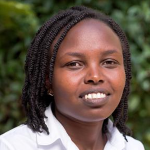Poster session: Rangeland, pastoralism, livestock, and GHG emissions
Managing emissions and nutrient losses from cattle manure through cascades with carbonized materials in Kenya
Improved use of manure is key to sustainable intensification of livestock systems and agricultural production across Sub-Saharan Africa. Common manure storage practices in heaps without covering are fraught with greenhouse gas and NH3 emissions which negatively impacts its climate footprint and fertiliser quality. Our research evaluates how amending manure with biochar (activated and non-activated) and charcoal at 10% and 30% influence GHG and NH3 emissions, manure nutrient content and CH4 and N2O emissions factors (EFs). Incubations of freshly collected solid dung, excluding urine, were done for each treatment over 105 days under aerobic conditions. Cumulative CH4 emissions from 10% biochar (1.44±0.13 g C kg-1 DW) and 30% activated biochar (1.64±0.22 g C kg-1 DW) were lower than emissions from control i.e. no amendment (2.40±0.34 g C kg-1 DW). Cumulative N2O emissions from 30% non-activated biochar (11.1±1.62 mg N kg-1) and 30% activated biochar (15.8±2.09 mg N kg-1) were lower than the control (27.2±2.94 mg N kg-1). In addition, biochar (activated and non-activated) and 30% charcoal addition significantly reduced NH3 cumulative emissions, with the 30% rates having lower NH3 emissions than the 10% rates. It was found that 10% activated biochar and 10% charcoal treatments had higher NO3- concentrations (+ 12 and + 3 µg NO3- N g-1 DW respectively) than the control. The 10% non-activated biochar, 30% biochar and charcoal treatments had lower NH4+, NO3-, and total N compared to the control. The N losses as N2O were higher in control (0.19±0.02%) than 30% biochar (0.07±0.01%), 30% activated biochar (0.11±0.01%) and 30% charcoal (0.14±0.02%). In terms of NH3, control treatment also had higher losses compared to the 30% concentrations. Emission factors of CH4 and N2O for all biochar enriched manure treatment were lower than the IPCC default values for solid storage. This study illustrates the potential of biochar cascades in farming systems to improve management of GHG emissions and nutrient in manure, which should be further explored to assess its feasibility for smallholder farmers.














